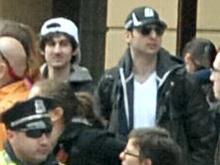Tamerlan Tsarnaev

Officials and local residents of a rural Virginia county say they’re surprised and angered that the body of Boston Marathon bombing suspect Tamerlan Tsarnaev was buried in a local cemetery.
Tsarnaev, 26, died following an April 19 getaway attempt after a gun battle with police. His younger brother, Dzhokhar Tsarnaev, was captured and remains in custody and is charged with the April 15 bombings that killed three and wounded more than 260 near the finish line of the race.
Their uncle, Ruslan Tsarni of Maryland, took responsibility for the body after Tamerlan Tsarnaev’s wife, Katherine Russell, said she wanted it released to her in-laws. He said his nephew was buried in a cemetery in Doswell, Va., with the help of a faith coalition.

An undisclosed community on Wednesday accepted the body of Boston bombing suspect Tamerlan Tsarnaev, which is now “entombed,” according to police in Worcester, Mass.
Tsarnaev’s uncle, Ruslan Tsarni, found a funeral home in Worcester to handle the body, but had struggled to get a cemetery to accept it. The Boston Globe reported that the body is buried in a community outside Massachusetts.
“As a result of our public appeal for help, a courageous and compassionate individual came forward to provide the assistance needed to properly bury the deceased,” read a statement posted on the Worcester Police Department’s website.

Soon after the Boston Marathon bombings, local Christian leaders stepped swiftly into the public eye, convening vigils and urging peaceful healing in the wake of senseless violence.
But their public voices have fallen mostly silent as noisy resistance grows to the prospect that suspected bomber Tamerlan Tsarnaev could be buried in local soil.
Cemeteries and even some mosques have refused to take his body. His city, Cambridge, has urged family members to bury him elsewhere. Republican U.S. Senate candidate Gabriel Gomez and local talk radio host Dan Rae want him dumped in the ocean, like Osama bin Laden. Clergy have largely kept mum.
“The only signs of people who are showing some sort of moral conscience are those few who stand with a card near the funeral home saying [burial] is a corporal work of mercy,” said James Keenan, a moral theologian at Boston College. “To say, ‘we won’t bury him’ makes us barbaric. It takes away mercy, the trademark of Christians. … I’m talking about this because somebody should.”

When I got off the plane at O’Hare Airport in Chicago on my way home to Boston on April 15, I couldn’t believe my eyes. Televisions blaring everywhere showed my beloved city at her premier event of the year, the Boston Marathon. Everyone knows the rest of the story.
“Is this for real? How can this be?” I asked, unable at first to face the reality of what had occurred. Feelings of fear and anger followed quickly on the heels of the denial.
Leaders responded quickly: the mayor, the governor, the president. “Any responsible individuals, any responsible groups will feel the full weight of justice,” promised President Barack Obama.
What is justice? Vengeful words immediately spewed from talk shows and bloggers’ keyboards. “We must catch them alive and make them suffer as much as possible. That will pay them back for what they did,” spewed those who equate justice with revenge.
Of course, violence begets more violence. Gandhi put it succinctly: “An eye for an eye makes the whole world blind.” Paul exhorted the Romans, “Repay no one evil for evil, but take thought for what is noble in the sight of all. . . Beloved, never avenge yourselves, but leave it to God, for it is written, ‘Vengeance is mine, I will repay,’ says the Lord. (Romans 12:17,19.)”
When Karen Hunt Ahmed and her Muslim husband divorced four years ago, many friends asked her, “Now you can stop this Islam stuff, right?”
Some friends, she thought.
“Like it was a hobby I took up when I got married and now I’m supposed to drop it,” said Hunt Ahmed, president of the Chicago Islamic Microfinance Project, which she founded with two colleagues in 2009.
Hunt Ahmed, 45, is part of a growing sorority of female American converts to Islam, especially those who are or were married to Muslim men, who must deal with the perception that they converted to Islam because of domineering boyfriends or husbands.
The stereotype was revived in the wake of the Boston Marathon bombings, when news emerged that the wife of bombing suspect Tamerlan Tsarnaev, Katherine Russell, converted to Islam after meeting Tsarnaev in 2009 or 2010 when she was about 21.